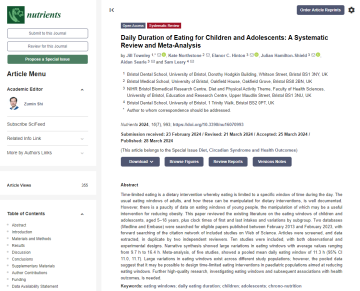Study suggests time-limited eating could be possible in children and adolescents
- 9 April 2024
The results of a new study suggest it may be possible to design programmes aimed at introducing children and adolescents to time-limited eating. This could potentially help prevent obesity in this age group, based on evidence of adults benefitting from time-limited eating.
Researchers wanted to understand whether children and young people had a typical ‘eating window’ – the length of time from when someone starts eating to when they have their last bite of the day. To do this, they reviewed 10 previous studies measuring eating windows in 4,589 children and young people aged 6-20.
They found big differences between eating windows identified in the analysed studies. Some eating windows were as short as 9.7 hours, while others were up to 16.4 hours long. On average, children and young people had a daily eating window of about 11.3 hours.
A few studies also suggested that eating windows tend to get longer as children move into their teenage years, possibly because young people stay awake later into the evening. Researchers suggested that the big differences between studies could be because of things like different eating habits and routines in diverse cultures and countries.
Overall, the research team highlighted that more high-quality studies are needed before any time-restricted eating programs could be recommended for children and adolescents. Future studies should focus on the potential links between eating windows and health in younger age groups.
Jill Townley, lead author, said:
“We know that time-limited eating can help adults reduce their body weight, improve metabolic disease risk factors, and reduce total cholesterol, triglyceride and glucose levels. However, we do not fully understand whether children and young people could also benefit from this type of intervention.
“Our review demonstrates that both clock times of eating and daily eating windows showed considerable variation between different studies. However, the pooled data suggests it may be possible to design time-limited eating interventions in children and young people.
“Further high-quality research, investigating eating windows and subsequent associations with health outcomes, is needed.”
